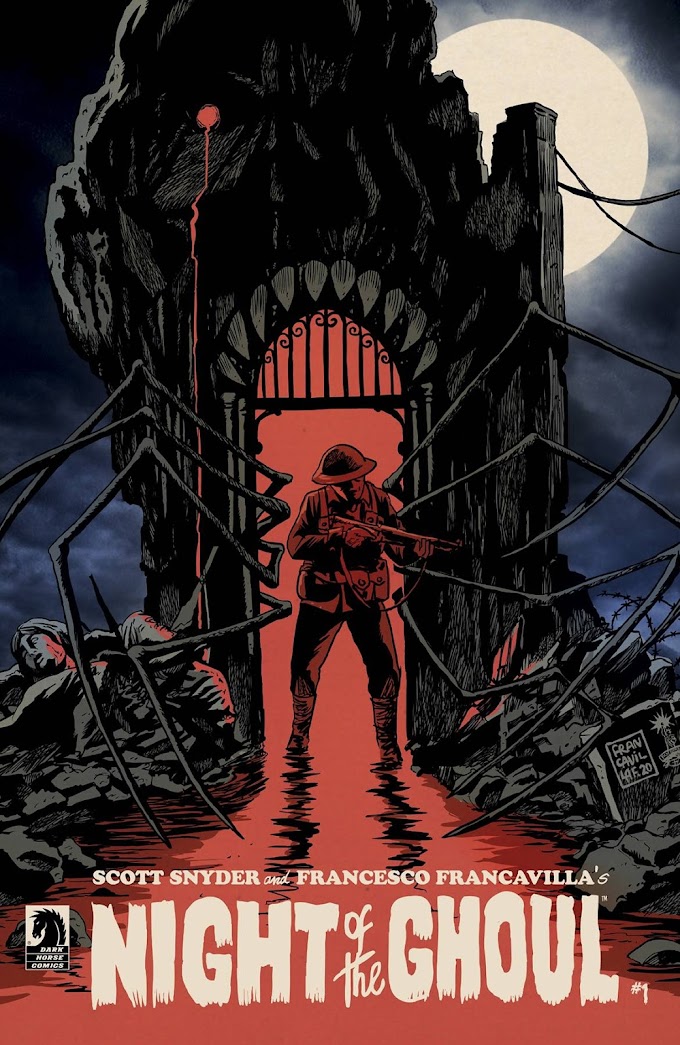Written by Paul Cornell
Illustrated by Jimmy Broxton (with Staz Johnson)
DC
They're Britain's answer to the Dynamic Duo, and the forces they face have a feel to them as unique to London as Batman's foes are to Gotham City. But they aren't the only echo, as Jarvis Poker, the British Joker, still haunts the city to give it a good laugh.
While negotiating the strange world of the British superhero, where one's own past might be as likely to hurt as the present, a rather prominent American stops by, to bring try to bring his own warped sense of order to the British Isles. Can even the combined might of Britain's heroes and villains stop Batman's greatest enemy when he's set his sights on painting the town red? Find out in the adventures of Knight and Squire!
Taking an idea from the prolific mind of Grant Morrison, Paul Cornell makes this an extremely British comic book, from the settings to the speech to the jokes, and even the moral at the end. Though there have been many British Invasion writers, from Alan Moore to Morrison to Neil Gaiman, none of them seem to have attempted to make an American comic so very English. Cornell revels in his setting and the geographic origins of his characters, even going so far as to having a page of explanation to help his readers out at the end.
What I like best about this comic is that Cornell doesn't try to make the relationship between Beryl and Cyril similar to Bruce and Dick (or Jason or Tim or Stephanie or Damien). They are their own pair, with their own relationship, which is explained in a flashback sequence that works organically into the narrative. They can't do justice the Batman way, because this isn't Gotham. It wouldn't be civilized.
That doesn't mean there isn't action. Knight and Squire are part of a bar room brawl, beat up a set of skinheads disguised as an old English tradition, and even take down the gangs of the former Kings of England, in a sequence that has Peter David-like inside jokes and multiple nods and winks to the reader. However, there's a lot of intellectual ideas going on in the comic, making it more cerebral than we've seen these days from a standard superhero comic.
It's not that Cornell is the only person writing smart superhero comics that cover themes beyond absolute good and evil. However, unlike the complex comics set up by Morrison or the sprawling epics written over the course of a decade by Bendis, Cornell gives the reader everything they need within this six issue series. There's no need to read more (although I think any reader finishing this will want more by Cornell and look for other adventures featuring the characters) or know decades-long bits of continuity.
This collection moves quickly, bouncing from idea to idea and yet telling a complete story each time, something quite rare in today's comics. This is a series that would have read just fine in single issues, but works well as a collection, too. Most ideas are done-in-one, with only one cliffhanger, yet the whole thing hangs together neatly. Even the title of the story "For Six" recognizes the limited nature of the series and puns on it at the same time. That's the kind of cleverness you'll find in spades here by Cornell.
I don't want to spoil everything that goes on in this collection, but here are a few things you're in for when you read this book: There are over 100 new characters created by Cornell and Broxton, many of whom are one-panel cameos. British television shows, both popular and obscure, find their way into the text in clever visual and verbal ways. There's a neat take on Alfred, a love story that's unexpected, a new wrinkle related to cloning that I don't think we've ever considered, and even a snark about the fact that Britain doesn't have a written constitution. Every page is an adventure of references, jokes, and ideas. This is a comic that shows the power of the medium, and also proves that superhero comics can hold their own against any other type of comic, in the right hands.
The best part of this comic, however, is that it serves as a reflection and commentary on many of its contemporary comics from DC and other companies. The British heroes and villains don't see the need to be as violent as their counterparts, yet they never find themselves feeling less of a person for it. When the Joker arrives, he hates all of Britain, hero and villain alike, for refusing to see the world like he does. His speech could come from the mouth of just about any current writer, trying to defend their latest over the top violent act in a comic. I don't know if that was a Simone/David-like intentional swipe or just my own reading, but I found the effect powerful. Why does the superhero comics world have to be so violent, dark, and bloody, in every single book? It's a question this series leaves unanswered, and one that I think has to be asked.
I absolutely loved this book, because I'm a fan of British humor and an even bigger fan of well-written comics. This is a mini-series done right, and comes with a recommendation for both Batman fans, Morrison fans, Anglophiles, and anyone who wants an action series where stories and character as just as important as the action.
Footer Copyright
Design by - Blogger Templates | Distributed by Free Blogger Templates






![Sweat and Soap [Ase to Sekken] by Kintetsu Yamada](https://blogger.googleusercontent.com/img/b/R29vZ2xl/AVvXsEgMnQltxjWqGS1_duhCp9Er1a0NbALuSFrqvjaV4_PjN_w67xCGghYt-l0qKyqTH7Ei7gbq_mxVq8aPAuOiyaArwAMLJWhpGmOYaARUBnwvjmv2-ZIe20m_zR5CvKnPdI6US_AuOnmi3gSX/w680/57525895-BA7E-4EF8-9FE4-89F9C164E1A4.jpeg)

